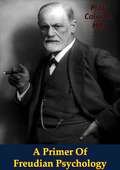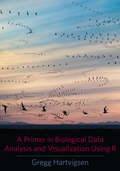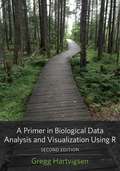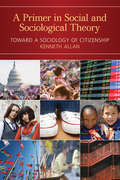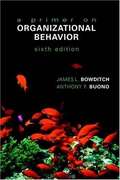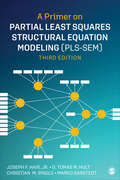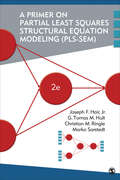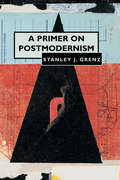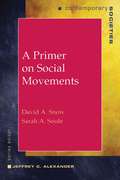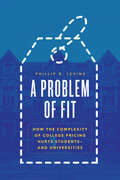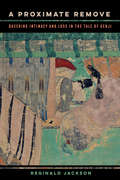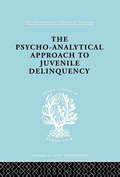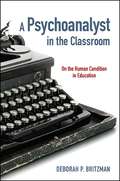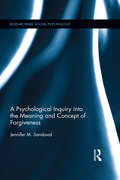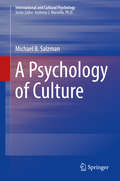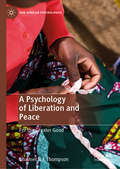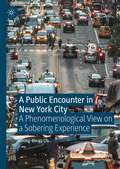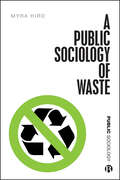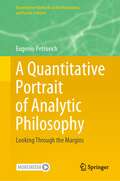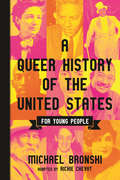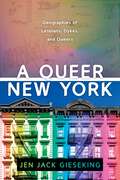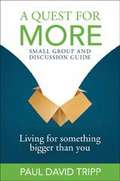- Table View
- List View
A Primer Of Freudian Psychology
by Prof. Calvin S. HallBASICS OF HUMAN BEHAVIORAbsorbing, easy to read and understand, here is a fascinating presentation of Freud's principal theories on psychology. Culled from forty years of writing by the founder of psychoanalysis, this is the first book which gives, in a comprehensive and systematic form, Freud's thinking on the organization, dynamics and development of the normal human personality.Calvin S. Hall outlines Freud's penetrating diagnosis of the balances existing between the mind and emotions, and points out his important discoveries about the parts played by instincts, the conscious and unconscious, and anxiety in the functioning of the human psyche. In discussing the elements that form personality, the author explains the ideas of the pioneer thinker in psychology on defense mechanisms, the channeling of instinctual drives, and the role of sex in the boy and girl maturing into man and woman.Lucid, illuminating and instructive, this is an important book for everyone who wants to understand human behavior--in himself and in others."A Primer of Freudian Psychology is compact, readable, accurate."--Gordon W. Allport, Professor of Psychology, Harvard University
A Primer in Biological Data Analysis and Visualization Using R
by Gregg HartvigsenR is the most widely used open-source statistical and programming environment for the analysis and visualization of biological data. Drawing on Gregg Hartvigsen's extensive experience teaching biostatistics and modeling biological systems, this text is an engaging, practical, and lab-oriented introduction to R for students in the life sciences.Underscoring the importance of R and RStudio in organizing, computing, and visualizing biological statistics and data, Hartvigsen guides readers through the processes of entering data into R, working with data in R, and using R to visualize data using histograms, boxplots, barplots, scatterplots, and other common graph types. He covers testing data for normality, defining and identifying outliers, and working with non-normal data. Students are introduced to common one- and two-sample tests as well as one- and two-way analysis of variance (ANOVA), correlation, and linear and nonlinear regression analyses. This volume also includes a section on advanced procedures and a chapter introducing algorithms and the art of programming using R.
A Primer in Biological Data Analysis and Visualization Using R
by Gregg HartvigsenR is the most widely used open-source statistical and programming environment for the analysis and visualization of biological data. Drawing on Gregg Hartvigsen’s extensive experience teaching biostatistics and modeling biological systems, this text is an engaging, practical, and lab-oriented introduction to R for students in the life sciences.Underscoring the importance of R and RStudio in organizing, computing, and visualizing biological statistics and data, Hartvigsen guides readers through the processes of correctly entering and analyzing data and using R to visualize data using histograms, boxplots, barplots, scatterplots, and other common graph types. He covers testing data for normality, defining and identifying outliers, and working with non-normally distributed data. Students are introduced to common one- and two-sample tests as well as one- and two-way analysis of variance (ANOVA), correlation, and linear and nonlinear regression analyses. This volume also includes a section on advanced procedures and a chapter outlining algorithms and the art of programming using R.This second edition has been revised to be current with the versions of R software released since the book’s original publication. It features updated terminology, sources, and examples throughout.
A Primer in Social and Sociological Theory: Toward a Sociology of Citizenship
by Kenneth AllanA fascinating guide to thinking theoretically about the social worldOrganized around the discourses of modernity, democracy, and citizenship, A Primer in Social and Sociological Theory: Toward a Sociology of Citizenship helps readers to develop skills in critical thinking and theory analysis as they explore nine central ideas of thought: modernity, society, self, religion, capitalism, power, gender, race, and globalization. Each chapter concludes with a section that discusses the craft of citizenship as it relates to the chapter content.
A Primer on Organizational Behavior
by James L. Boditch Anthony F. BuonoTo introduce the key concepts that provide the basis for understanding of the field and give students a general survey of "typical" OB
A Primer on Partial Least Squares Structural Equation Modeling (PLS-SEM)
by G. Tomas Hult Marko Sarstedt Christian M. Ringle Joe HairThe third edition of A Primer on Partial Least Squares Structural Equation Modeling (PLS-SEM) guides readers through learning and mastering the techniques of this approach in clear language. Authors Joseph H. Hair, Jr., G. Tomas M. Hult, Christian Ringle, and Marko Sarstedt use their years of conducting and teaching research to communicate the fundamentals of PLS-SEM in straightforward language to explain the details of this method, with limited emphasis on equations and symbols. A running case study on corporate reputation follows the different steps in this technique so readers can better understand the research applications. Learning objectives, review and critical thinking questions, and key terms help readers cement their knowledge. This edition has been thoroughly updated, featuring the latest version of the popular software package SmartPLS 3. New topics have been added throughout the text, including a thoroughly revised and extended chapter on mediation, recent research on the foundations of PLS-SEM, detailed descriptions of research summarizing the advantages as well as limitations of PLS-SEM, and extended coverage of advanced concepts and methods, such as out-of-sample versus in-sample prediction metrics, higher-order constructs, multigroup analysis, necessary condition analysis, and endogeneity.
A Primer on Partial Least Squares Structural Equation Modeling (PLS-SEM)
by G. Tomas Hult Marko Sarstedt Christian M. Ringle Joe HairThe third edition of A Primer on Partial Least Squares Structural Equation Modeling (PLS-SEM) guides readers through learning and mastering the techniques of this approach in clear language. Authors Joseph H. Hair, Jr., G. Tomas M. Hult, Christian Ringle, and Marko Sarstedt use their years of conducting and teaching research to communicate the fundamentals of PLS-SEM in straightforward language to explain the details of this method, with limited emphasis on equations and symbols. A running case study on corporate reputation follows the different steps in this technique so readers can better understand the research applications. Learning objectives, review and critical thinking questions, and key terms help readers cement their knowledge. This edition has been thoroughly updated, featuring the latest version of the popular software package SmartPLS 3. New topics have been added throughout the text, including a thoroughly revised and extended chapter on mediation, recent research on the foundations of PLS-SEM, detailed descriptions of research summarizing the advantages as well as limitations of PLS-SEM, and extended coverage of advanced concepts and methods, such as out-of-sample versus in-sample prediction metrics, higher-order constructs, multigroup analysis, necessary condition analysis, and endogeneity.
A Primer on Partial Least Squares Structural Equation Modeling (PLS-SEM)
by G. Tomas Hult Marko Sarstedt Dr Joe Hair Dr Christian M. RingleA Primer on Partial Least Squares Structural Equation Modeling (PLS-SEM) by Joseph F. Hair, Jr., G. Tomas M. Hult, Christian Ringle, and Marko Sarstedt is a practical guide that provides concise instructions on how to use partial least squares structural equation modeling (PLS-SEM), an evolving statistical technique, to conduct research and obtain solutions. Featuring the latest research, new examples using the SmartPLS software, and expanded discussions throughout, the Second Edition is designed to be easily understood by those with limited statistical and mathematical training who want to pursue research opportunities in new ways.
A Primer on Partial Least Squares Structural Equation Modeling (PLS-SEM)
by G. Tomas Hult Marko Sarstedt Dr Joe Hair Dr Christian M. RingleA Primer on Partial Least Squares Structural Equation Modeling (PLS-SEM) by Joseph F. Hair, Jr., G. Tomas M. Hult, Christian Ringle, and Marko Sarstedt is a practical guide that provides concise instructions on how to use partial least squares structural equation modeling (PLS-SEM), an evolving statistical technique, to conduct research and obtain solutions. Featuring the latest research, new examples using the SmartPLS software, and expanded discussions throughout, the Second Edition is designed to be easily understood by those with limited statistical and mathematical training who want to pursue research opportunities in new ways.
A Primer on Postmodernism
by Stanley J. GrenzFrom the academy to pop culture, our society is in the throes of change rivaling the birth of modernity out of the decay of the Middle Ages. We are now moving from the modern to the postmodern era.But what is postmodernism? How did it arise? What characterizes the postmodern ethos? What is the postmodern mind and how does it differ from the modern mind? Who are its leading advocates? Most important of all, what challenges does this cultural shift present to the church, which must proclaim the gospel to the emerging postmodern generation?Stanley Grenz here charts the postmodern landscape. He shows the threads that link art and architecture, philosophy and fiction, literary theory and television. He shows how the postmodern phenomenon has actually been in the making for a century and then introduces readers to the gurus of the postmodern mind-set. What he offers here is truly an indispensable guide for understanding today's culture.
A Primer on Social Movements (Contemporary Societies Series)
by Sarah A. Soule David A. SnowAward-winning sociologists David Snow and Sarah Soule draw from a broad range of theories including political sociology, theories of organizations, and the study of culture and social interaction to introduce the essential ideas for analyzing social movements.
A Problem of Fit: How the Complexity of College Pricing Hurts Students—and Universities
by Phillip B. LevineA critical examination of the complex system of college pricing—how it works, how it fails, and how fixing it can help both students and universities. How much does it cost to attend college in the United States today? The answer is more complex than many realize. College websites advertise a sticker price, but uncovering the actual price—the one after incorporating financial aid—can be difficult for students and families. This inherent uncertainty leads some students to forgo applying to colleges that would be the best fit for them, or even not attend college at all. The result is that millions of promising young people may lose out on one of society’s greatest opportunities for social mobility. Colleges suffer too, losing prospective students and seeing lower enrollments and less socioeconomic diversity. If markets require prices to function well, then the American higher-education system—rife as it is with ambiguity in its pricing—amounts to a market failure. In A Problem of Fit, economist Phillip B. Levine explains why institutions charge the prices they do and discusses the role of financial aid systems in facilitating—and discouraging—access to college. Affordability issues are real, but price transparency is also part of the problem. As Levine makes clear, our conversations around affordability and free tuition miss a larger truth: that the opacity of our current college-financing systems is a primary driver of inequities in education and society. In a clear-eyed assessment of educational access and aid in a post-COVID-19 economy, A Problem of Fit offers a trenchant new argument for educational reforms that are well within reach.
A Proximate Remove: Queering Intimacy and Loss in The Tale of Genji (New Interventions in Japanese Studies #2)
by Reginald JacksonA free ebook version of this title is available through Luminos, University of California Press's Open Access publishing program. Visit www.luminosoa.org to learn more. How might queer theory transform our interpretations of medieval Japanese literature and how might this literature reorient the assumptions, priorities, and critical practices of queer theory? Through a close reading of The Tale of Genji, an eleventh-century text that depicts the lifestyles of aristocrats during the Heian period, A Proximate Remove explores this question by mapping the destabilizing aesthetic, affective, and phenomenological dimensions of experiencing intimacy and loss. The spatiotemporal fissures Reginald Jackson calls "proximate removes" suspend belief in prevailing structures. Beyond issues of sexuality, Genji queers in its reluctance to romanticize or reproduce a flawed social order. An understanding of this hesitation enhances how we engage with premodern texts and how we question contemporary disciplinary stances.
A Psycho-Analytical Approach to Juvenile Delinquency: Theory, Case Studies, Treatment (International Library of Sociology)
by Kate FriedlanderFirst published in 1998. Routledge is an imprint of Taylor & Francis, an informa company.
A Psychoanalyst in the Classroom: On the Human Condition in Education (SUNY series, Transforming Subjects: Psychoanalysis, Culture, and Studies in Education)
by Deborah P. BritzmanA Psychoanalyst in the Classroom provides rich descriptions of the surprising ways individuals handle matters of love and hate when dealing with reading and writing in the classroom. With wit and sharp observations, Deborah P. Britzman advocates for a generous recognition of the vulnerabilities, creativity, and responsibilities of university learning. Britzman develops themes that include the handling of technique in psychoanalysis and pedagogy, the uses of theory, regression to adolescence, the inner life of gender, the untold story of the writing block, and everyday mistakes in teaching and learning. She also examines the relationship between mental health and experiences of teaching and learning.
A Psychological Inquiry into the Meaning and Concept of Forgiveness (Researching Social Psychology)
by Jennifer M. SandovalThis book explores the psychological nature of forgiveness for both the subjective ego and what Jung called the objective psyche, or soul. Utilizing analytical, archetypal, and dialectical psychological approaches, the notion of forgiveness is traced from its archetypal and philosophical origins in Greek and Roman mythology through its birth and development in Judaic and Christian theology, to its modern functional character as self-help commodity, relationship remedy, and global necessity. Offering a deeper understanding of the concept of "true" forgiveness as a soul event, Sandoval reveals the transformative nature of forgiveness and the implications this notion has on the self and analytical psychology.
A Psychology of Culture (International and Cultural Psychology)
by Michael B. SalzmanThis thought-provoking treatise explores the essential functions that culture fulfills in human life in response to core psychological, physiological, and existential needs. It synthesizes diverse strands of empirical and theoretical knowledge to trace the development of culture as a source of morality, self-esteem, identity, and meaning as well as a driver of domination and upheaval. Extended examples from past and ongoing hostilities also spotlight the resilience of culture in the aftermath of disruption and trauma, and the possibility of reconciliation between conflicting cultures. The stimulating insights included here have far-reaching implications for psychology, education, intergroup relations, politics, and social policy. Included in the coverage: #65533; Culture as shared meanings and interpretations. #65533; Culture as an ontological prescription of how to "be" and "how to live. " #65533; Cultural worldviews as immortality ideologies. #65533; Culture and the need for a "world of meaning in which to act. " #65533; Cultural trauma and indigenous people. #65533; Constructing situations that optimize the potential for positive intercultural interaction. #65533; Anxiety and the Human Condition. #65533; Anxiety and Self Esteem. #65533; Culture and Human Needs. A Psychology of Culture takes an uncommon tour of the human condition of interest to clinicians, educators, and practitioners, students of culture and its role and effects in human life, and students in nursing, medicine, anthropology, social work, family studies, sociology, counseling, and psychology. It is especially suitable as a graduate text.
A Psychology of Liberation and Peace: For the Greater Good (Pan-African Psychologies)
by Chalmer E. ThompsonThis book addresses the need to radically transform societies plagued by racism. It places prominence on persistent racialized violence in the lives of Black Americans as influential in how Black people in the U.S. and abroad perceive themselves as Black in juxtaposition to their perceptions of White people and other People of Color. An absence of understanding of the often-masked role of violence in the lives of Black people increases the likelihood of reproducing it. The author offers a reformulation of racial identity theory to examine the construction of Manichaeism in people and societies, and how meaningful engagement that confronts the violence is vital to psychological development, though this engagement also is not without dire risks.
A Public Encounter in New York City: A Phenomenological View on a Sobering Experience
by Joong-Hwan OhThis book examines the essence of a particular personal experience within a New York City public space. The principal approach, both theoretical and methodological, is the phenomenological perspective, an in-depth study of such a surprising experience in the real world from the first-person point of view. The book introduces a new concept of “the situated self,” that is, the whole entity of the respondent’s subjective world about his or her particular urban experience in public. It is one’s “being-in-the-word” or lived experience in the real world. Another important feature of “the situated self” is its comprehensive constitution of all certain human traits, perceptions, emotions, bodily sensations, cognition, and behavioral reaction, and their close situational connectivity to one another. By implication, this public experience of “the situated self” is a common denominator shared among regular users of New York City public spaces for making their city life with urban strangers more routinized, predictable, tolerant, and civic.
A Public Sociology of Waste (Public Sociology)
by Myra J. HirdIs it possible for individuals to tackle waste by recycling, reusing and reducing alone? This provocative book critically analyses the widespread assumption that individuals and households have created our global waste crisis. Sociologist and waste expert Myra J. Hird reveals neoliberal capitalism’s fallacy of infinite growth as the real culprit, and demonstrates how industry and local governments work in tandem to deflect our attention away from the real causes of our global waste problem. Hird offers crucial insights into the relations between waste and wider societal issues including ongoing (settler) colonialism, poverty, racism and sexism, and showcases how sociology may provide solutions through a ‘pubic imagination’ of waste.
A Quantitative Portrait of Analytic Philosophy: Looking Through the Margins (Quantitative Methods in the Humanities and Social Sciences)
by Eugenio PetrovichThis book offers an unprecedented quantitative portrait of analytic philosophy focusing on two seemingly marginal features of philosophical texts: citations and acknowledgements in academic publications. Originating from a little network of philosophers based in Oxford, Cambridge, and Vienna, analytic philosophy has become during the Twentieth century a thriving philosophical community with thousands of members worldwide. Leveraging the most advanced techniques from bibliometrics, citations and acknowledgments are used in this book to shed light on both the epistemology and the sociology of this philosophical field, illuminating the intellectual trajectory of analytic philosophy as well as the social characteristics of the analytic community. Special attention is dedicated to the last forty years, providing insights into a phase of analytic philosophy which is still understudied by historians of philosophy. In the eight chapters of the book, readers will find not only numerous quantitative investigations and technical explanations, but also a robust theoretical framework and epistemological reflections on the strengths and limitations of quantitative methods for the study of philosophy. With its strong interdisciplinary appeal, this book will engage a wide range of scholars, including historians of philosophy seeking new methodologies, analytic philosophers interested in a new look at their discipline, and scholars in digital humanities, bibliometrics, and quantitative studies of science, who will find many innovative techniques for investigating disciplinary fields.
A Queer History of the United States for Young People (ReVisioning American History for Young People #1)
by Michael BronskiQueer history didn't start with Stonewall. This book explores how LGBTQ people have always been a part of our national identity, contributing to the country and culture for over 400 years.It is crucial for lesbian, gay, bisexual, transgender, and queer youth to know their history. But this history is not easy to find since it's rarely taught in schools or commemorated in other ways. A Queer History of the United States for Young People corrects this and demonstrates that LGBTQ people have long been vital to shaping our understanding of what America is today. Through engrossing narratives, letters, drawings, poems, and more, the book encourages young readers, of all identities, to feel pride at the accomplishments of the LGBTQ people who came before them and to use history as a guide to the future. Here we meet: * Indigenous tribes who embraced same-sex relationships and a multiplicity of gender identities. * Emily Dickinson, brilliant nineteenth-century poet who wrote about her desire for women. * Gladys Bentley, Harlem blues singer who challenged restrictive cross-dressing laws in the 1920s. * Bayard Rustin, Dr. Martin Luther King Jr.'s close friend, civil rights organizer, and an openly gay man. * Sylvia Rivera, cofounder of STAR, the first transgender activist group in the US in 1970. * Kiyoshi Kuromiya, civil rights and antiwar activist who fought for people living with AIDS. * Jamie Nabozny, activist who took his LGBTQ school bullying case to the Supreme Court. * Aidan DeStefano, teen who brought a federal court case for trans-inclusive bathroom policies. * And many more!With over 60 illustrations and photos, a glossary, and a corresponding curriculum, A Queer History of the United States for Young People will be vital for teachers who want to introduce a new perspective to America's story.
A Queer New York: Geographies of Lesbians, Dykes, and Queers
by Jen Jack GiesekingWinner, 2021 Glenda Laws Award given by the American Association of GeographersThe first lesbian and queer historical geography of New York CityOver the past few decades, rapid gentrification in New York City has led to the disappearance of many lesbian and queer spaces, displacing some of the most marginalized members of the LGBTQ+ community. In A Queer New York, Jen Jack Gieseking highlights the historic significance of these spaces, mapping the political, economic, and geographic dispossession of an important, thriving community that once called certain New York neighborhoods home.Focusing on well-known neighborhoods like Greenwich Village, Park Slope, Bedford-Stuyvesant, and Crown Heights, Gieseking shows how lesbian and queer neighborhoods have folded under the capitalist influence of white, wealthy gentrifiers who have ultimately failed to make room for them. Nevertheless, they highlight the ways lesbian and queer communities have succeeded in carving out spaces—and lives—in a city that has consistently pushed its most vulnerable citizens away.Beautifully written, A Queer New York is an eye-opening account of how lesbians and queers have survived in the face of twenty-first century gentrification and urban development.
A Quest for Humanity
by Menno BoldtIn A Quest for Humanity, Menno Boldt presents a persuasive new framework for achieving a human social order in the global age. Boldt explores the concept of 'the good society' as a world in which every person can realize their potential for humanity through liberty, social justice, and equal human dignity.A Quest for Humanity innovatively positions globalization as a deterministic phenomenon of expanding interdependence and shared knowledge -- resulting in ever-larger economic and political jurisdictions, but also creating social and psychological links between peoples across the world. Boldt challenges mainstream certainty that Western democracy and constitutional human rights are the exemplary doctrines for the global good society. With a fresh vision designed to inspire a universal acknowledgement of human dignity, A Quest for Humanity powerfully affirms the value of each human being.
A Quest for More: Living for Something Bigger Than You
by Paul David Tripp Michael BreecePaul David Tripp expertly traverses the deepest recesses of the human heart and compassionately invites fellow Christian travelers to journey with him into God's bigger kingdom in this comprehensive personal and group study guide. Readers will appreciate and be challenged by the extensive and intuitive questions and comments that skillfully lead individuals through the text of A Quest for More while allowing for more in-depth interaction and introspection in both a personal and group setting. Whether used at home for personal study or offered as a church-wide series, this flexible guide will effectively meet the end goals of deeper biblical understanding and powerful life changes.
